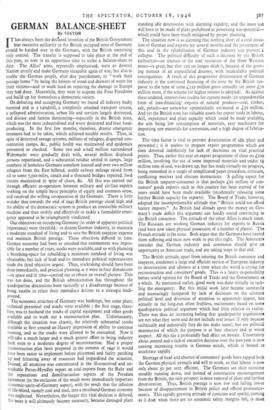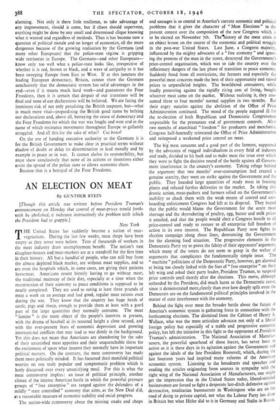GERMAN BALANCE-SHEET
By VIATOR
IT has always been the declared intention of the British Government that executive authority in the British occupied zone of Germany should be handed over to the Germans, with the British exercising only control. The transfer is supposed to take place at the end of this year, so now is an opportune time to strike a balance-sheet to date. The Allies' aims, repeatedly emphasised, were to destroy Nazism utterly and make Germany incapable again of war, but also to
enable the German people, after due punishment, to " work their passage home " by being the hewers of wood and drawers of water for their victims—and to work hard on repairing the damage to Europe they had done. Meanwhile, they were to acquipe the Four Freedoms and build up for themselves a democratic society.
On defeating and occupying Germany we found all industry badly
battered and at a standstill, a completely smashed transport system, a collapsed administration, urban life and services largely destroyed, and disease and famine threatening—especially in the British zone, which was the most industrialised and worst destroyed and least food- producing. In the first few months, therefore, drastic emergency measures had to be taken, which achieved notable results. Thus, in spite of destroyed sewage systems, millions of refugees, dispersed con- centration camps, &c., public health was maintained and epidemics prevented or checked. Some two and a-half million surrendered Wehrmacht were gradually dealt with, several million displaced persons repatriated, and a substantial residue settled in camps, large numbers of homeless Germans somehow housed and over two million refugees from the East billeted, usable railway mileage raised from nil to some 7,50o miles, canals and a thousand bridges repaired, food rations maintained in spite of chaos, &c. All this was carried out through efficient co-operation between military and civilian experts working on the simple basic principles of equity and common sense, and received the willing co-operation of the Germans. There is little wonder that towards the end of 1945 British prestige stood high and the ability of the democratic system to produce an irresistible military machine and then swiftly and effectively to tackle a formidable emer- gency appeared to be triumphantly vindicated.
Our objectives on occupying Germany (in order of apparent political importance) were threefold : to disarm German industry, to maintain a moderate standard of living and to save the British taxpayer expense and maintain British prestige. These objectives differed in time. German economy had been so smashed that rearmament was impos- sible for a number of years, stocks were available, and so with planning a breathing-space for rebuilding a minimum standard of living was obtainable, but lack of food and its immediate political repercussions made the third objective urgent. Thus, stocktaking should have been done immediately, and practical planning as it were in four dimensions —in space and in time—carried out to obtain an overall picture. This was not done, and the British administration has throughout the quadripartite discussions been tactically at a disadvantage because of being unable to relate their immediate actions to a strategic back- ground.
The economic structure of Germany was bankrupt, but some plant, technical personnel and stocks were available ; the first stage, there- fore, was to husband the stocks of capital equipment and other goods available and to work out a reconstruction plan. Unfortunately, although the situation was chaotic, the relatively substantial stocks available at first created an illusory impression of ability to continue running, and so the stocks were allowed to be consumed. Now it will take a much larger and a much greater effort to bring industry back even to a moderate degree of reconstruction. Had a proper reconstruction plan been prepared in the autumn of 1945 it would have been easier to implement before piecemeal and faulty patching
up and frittering away of resources had jeopardised the situation. Instead, all attention was concentrated in the ill-conceived and un- workable Potter-Hynclley report on coal exports from the Ruhr and the reparations and demilitarisation aspects of the Potsdam agreement (to the exclusion of the much mote immediately important economic-unity-of-Germany aspect), with the result that the infusion of life-blood, namely coal and steel, into a moribund German economy was neglected. Nevertheless, the longer this vital decision is delayed, the more it will ultimately become necessary, because damaged plant
standing idle deteriorates with alarming rapidity, and the more use will have to be made of plant prohibited as possessing war-potential- which could have been much mitigated by proper planning.
The situation now is so alarming that nothing short of a total cessa- tion of German coal exports for several months and the investment of this coal in the rehabilitation of German industry can prevent a collapse. The political difficulty of such a decision by the British authorities—as trustees of the coal resources of the three Western zones—is great, but they can no longer shirk it, because of the grow- ing menace of an unparalleled disaster, with incalculable political consequences. A result of this progressive deterioration of German industry is the continued financing of the zone by the British tax- payer to the tune of some £130 million gross annually (or some £50 million more, if the scheme for higher rations is adopted). As against these undated, interest-free credits for current needs (an unpardonable form of loan-financing) exports of natural produce—coal, timber, salt, potash—are somewhat optimistically estimated at £50 million. And yet the British zone has valuable assets for export trade in labour, skill, experience and plant capacity which could be made available, the aim being low consumption of materials, easy machinery for importing raw materials for conversion, and a high degree of fabrica- tion.
The time factor is vital to prevent deterioration of idle plant and personnel ; it is useless to prepare export programmes which are then deferred indefinitely for lack of decisions on vital practical points. Thus, earlier this year an export programme of close on Lion million, involving the use of some imported materials and under if million tons of coal, was drawn up, but has made virtually no progress, being enmeshed in a tangle of complicated paper procedure, criticism, conflicting motives and obscure instructions. A galling aspect for the British taxpayer-consumer is that perhaps Lzo million of con- sumers' goods exports such as this country has been starved of for years could have been made available (incidentally releasing some further British capacity for exports). The Board of Trade, however, adopted the incomprehensible attitude that " Britain could not afford luxury imports." As Britain had already spent the money on Ger- many's trade deficit this argument can hardly sound convincing to the British consumer. The attitude of the other Allies is much saner. The Russians are working German industry for exports to Russia (and have now taken physical possession of a number of plants). The French attitude is the same. Both argue that the Germans have caused them suffering and must now work to put this right. The Americans consider that German industry and commerce should give an opportunity to American trade, and are taking steps to that end.
The British attitude, apart from injuring the British consumer and taxpayer, condemns a large and efficient section of European industry to deterioration and idleness at a time when the world is crying for reconstruction and consumers' goods. This is a heavy responsibility before world opinion for the Board of Trade and the Government as a whole. As mentioned earlier, good work was done initially in tack- ling the emergency. But this initial work later became constantly and increasingly hampered by lack of decisions on the ultimate political level and diversion of attention to apparently urgent, but actually in the long-run often fruitless, excitements based on some quadripartite political argument which had little relation to reality. There was thus an increasing feeling that quadripartite negotiations are not what they seem and do not include real issues (if only because technically and industrially they do not make sense), but are political ,manoeuvres of which the purpose is at best obscure and at worst suspect. All this has a profoundly bad effect on morale. UnCertainty about control and a lack of executive decision over the past year is now causing increasing trouble in German minds, which is bound to accelerate rapidly.
Shortage of food and absence of consumers' goods have sapped both the 'German physical strength and will to work, so that labour is now only about 5o per cent. efficient. The Germans see their economy steadily running down, and instead of constructive encouragement from the British, the only prospect is more removal of plant and further deterioration. Thus, British prestige is now low and falling lower because of disappointment in British policy and official pronounce- ments. This rapidly growing attitude of cynicism and apathy, coming as it does when there are no economic safety margins left, is most alarming. Not only is there little resilience, to take advantage of any improvement, should at come, but if chaos should supervene, anything might be done by any small and determined clique knowing what it wanted and regardless of methods. Thus it has become now a question of political morale and no longer of economics, all the more dangerous because of the growing realisation by the Germans (and many other Europeans) that the police-state regime is gripping wide territories in Europe. The Germans—and other Europeans— know only too well what a police-state looks like, irrespective of whether it is red, brown or black, and a wave of antipathy to it has been sweeping Europe from East to West. If at this juncture the leading European democracy, Britain, cannot show the Germans conclusively that the democratic system has solid advantages in the end—even if it means much hard work—and guarantees the Four Freedoms, then it is certain that despair of our intentions will be final and none of our declarations will be believed. We are facing the imminent risk of not only penalising the British taxpayer, but—what is much more vital—jeopardising the British good name by belying our declarations and, above all, betraying the cause of democracy and the Four Freedoms for which the war was fought and won and in the name of which resistance movements throughout Europe so gallantly struggled. And all this for the sake of what? Cui Bono?
On the eve of handing executive authority to the Germans it is for the British Government to make clear in practical terms without shadow of doubt or delay its determination to lead morally and by example in peace as in war. It cannot shelve its responsibility, but must show conclusively that none of its actions or intentions either assist the spread of the police state or allows economic chaos.
Because that is a betrayal of the Four Freedoms.































 Previous page
Previous page